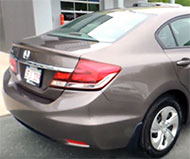7/23/2020
Federal Appeals Court Rejects Bogus Traffic StopNinth Circuit US Court of Appeals rejects a a car search because the police came up with implausible excuses for the traffic stop.

Courts generally allow police to pull over and stop motorists on a pretext, so long as they can come up with a valid reason to do so after the fact. In a rare case last week, the Ninth Circuit US Court of Appeals rejected a series of harmless behaviors that Nevada police officers had packaged into a presentation of "suspicion" to justify a stop.
A three-judge panel concluded that Officer Curtis English from the very start intended to stop the brown Honda he saw in Sparks on November 21, 2017. As far as he knew at the time, Joel Ralph Turnbow and his girlfriend, Tracy Method, were just driving on Galleron Way that afternoon. They committed no traffic violation, but the officer insisted there was a "crime trend" of Hondas being stolen, and that when he peered into the passenger window, the woman "quickly" looked away from him.
So Officer English ran the plates, and everything came back clear. Next, he decided to search Turnbow and Method's names in the database, and he found Turnbow had a four-month-old misdemeanor arrest warrant in Reno. The officer also alleged that Method was "moving a lot."
When pulled over, Turnbow had valid registration papers, but Officer English noted that the man was "sweating more than normal for the current temperature."
A drug dog was called in, but it did not alert. So the officer decided to search it anyway (no consent was given). Officer English explained that he was going to impound the car because, once Turnbow was arrested, Method would not be able to take the car because she did not have a valid driver's license. Before doing so he asked Method if she wanted to retrieve her purse from the front seat. Before she could take it, the sergeant asked to search it. It contained "a large sum of money in $20 bills."
It turned out that Turnbow was a felon with a black Taurus 709 9mm pistol and what appeared to be methamphetamine in the trunk, but that evidence could only be used if the traffic stop and search were conducted legally. The lower court judge and the appellate judges found the officer's testimony implausible and that there was no legitimate reason to impound the Honda.
"Officer English's community caretaking concerns were not well-founded," the three-judge panel explained. "It was daylight, the parking lot where the car was parked was not in a particularly high crime area, and even though the car was not parked in a specific parking spot, it was not blocking traffic. Further, even though Method did not have a valid driver's license, Officer English could have left the car in her custody to arrange for its safekeeping, which would have mitigated Officer English's purported concerns about incurring liability."
The initial search also did not meet the standards required by the Fourth Amendment to the Constitution.
"Ample evidence supported the district court's finding that Officer English's decision to impound Turnbow's car was pretextual," the three-judge panel concluded. "As the district court explained, the record showed that Officer English's suspicions of illegal activity began the moment he spotted Turnbow's car, and he took numerous steps to justify searching it until he finally settled on an inventory search."
Because neither the search nor the impound were justified, the court ruled that the evidence and the resulting case should be thrown out. A copy of the unpublished opinion is available in a 200k PDF file at the source link below.


